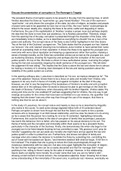Discuss the presentation of corruption in The Revenger’s Tragedy
The prevalent theme of corruption seems to be present in the play from the opening lines, in which
Vindice describes the Duke as “royal lecher: go, grey haired Adultery”. The use of the oxymoron
‘royal lecher’, not only shows the corruption of the state, but also of religion, as leaders and people
of power were said to be appointed by God, but on top of this, the noun ‘lecher’ could perhaps be
linked to the seven deadly sins, implying the Duke to be sinful, lustful and disgusting in nature.
Furthermore, the use of the capitalisation of ‘Adultery’ creates a proper noun and perhaps depicts
the idea that the Duke is more than just adulterous, he is Adultery personified. Therefore, simply
from the opening line of the play, corruption is presented through the character of the Duke, who
we immediately come to dislike, as he is described as everything he shouldn’t be as a man of his
power and authority. The corrupt nature of the Duke is also further highlighted in Act One Scene
Two at the trial of the Duchess’ youngest son. The Duke states that the youngest son has “stained
our honours”, the verb ‘stained’ showing how he believes Junior brother to have tainted their name
and left an everlasting mark on their reputation. It shows the Duke to be against the youngest son,
overcome with worry about reputation and keeping up appearances rather than justice, implying a
sense of twisted morality, as the Duke has committed crimes just as bad as the youngest son, such
as murdering Gloriana, showing his hypocrisy and perhaps also the corruption of the court and
justice system. On top of this, the Duke is shown to have authoritarian power, overruling the judges
during the trial and successfully stopping the death sentence of the youngest son, “We will defer
the judgement till next sitting”. This implies that the Duke is above the law and shows him to almost
be making a mockery of it, showing clear disrespect of the law and raising questions about the
reliability of the justice system as a whole.
In the opening soliloquy also, Lussurioso is described as “his son, as impious steeped as he”. The
use of the adjective ‘impious’ shows there to be a focus on piety and morality from Vindice, who
appears to be very much in favour of morality and against corruption at the start of the play.
However, we start to see the beginning of the breakdown of Vindice’s morality and anti-corruption
stance later on in the soliloquy when he starts to discuss his plan to get revenge on the Duke for
the death of Gloriana. Furthermore, when discussing with his brother Hippolito, Vindice states “thy
wrong and mine are for one scabbard fit” perhaps suggesting that for Vindice, the only way to get
revenge and justice for the crimes that have been committed is to use violence, the quantifier ‘one’
implying that she doesn’t see any other way than through the use of his weapon, that there is
nothing else that he can do about it.
In the study of Lussurioso, his corrupt nature and impiety is clear as he is described by Hippolito
who works in the courts, “to seek some strange digested fellow forth of ill-contented nature”.
Perhaps corruption is shown here through the fact that the Duke’s son wants to hire a pander,
someone who is messenger in an illicit sexual relationship, and how clear his desire is to do wrong
as he is aware that the person he is looking for is to be ‘ill contented’, highlighting immorality.
Furthermore, this could be linked to the idea of corruption of family links as perhaps Lussurioso
has learnt this behaviour from is father, who has passed on his sexual deviancy to his son. The
theme of family and the corruption and immorality within them seems to be a prevalent theme,
particularly in the character of the Duchess. Firstly, she demonstrates this when she begs for her
youngest son to be freed despite knowing he has committed a rape, “My gracious Lord I pray be
merciful” suggesting she can put aside any morality she might have and go against the law and
justice system in order to protect her son. Furthermore, she shows corruption of family and
marriage when she makes the decision to humiliate the Duke by cuckolding him, committing the
act of incest with his bastard son Spurio, “and therefore wedlock faith shall be forgot, I’ll kill him in
his forehead” This implies that she is going to torture the Duke psychologically through the
incestuous relationship with her step son, but also once again highlights the corruption of religion,
the fact that the marriage vows can be so easily discarded and that her marriage didn’t mean
anything to her, willing to throw it away for the sake of revenge. However, in this relationship,
Spurio starts out slightly more morally “tis a fouler name than lust; you are my father’s wife”,
showing a brief moment of moral concern, the comparative adjective ‘fouler’ showing him to have
some understanding of the immortality of the seven sins, in particular lust. However, eventually we





